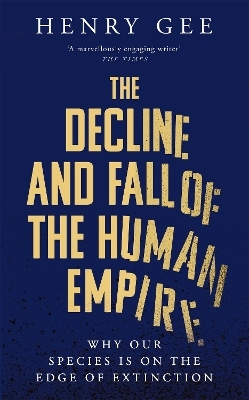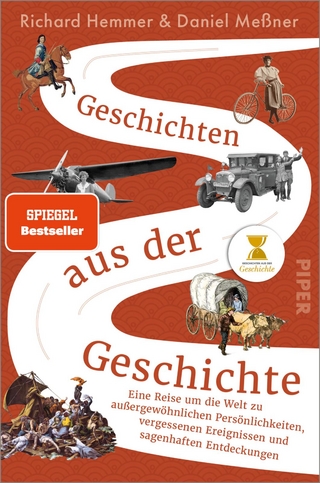
The Decline and Fall of the Human Empire
Why Our Species is on the Edge of Extinction
Seiten
2025
Picador (Verlag)
978-1-0350-3224-2 (ISBN)
Picador (Verlag)
978-1-0350-3224-2 (ISBN)
- Noch nicht erschienen (ca. März 2025)
- Portofrei ab CHF 40
- Auch auf Rechnung
- Artikel merken
Nature editor and Science Book Prize winner Henry Gee explores the future of our species and our probable extinction, while suggesting how, through technological innovation, we might indefinitely postpone our fate.
'A marvellously engaging writer' – The Times
From the winner of the 2022 Royal Society Science Book Prize, a thrilling and thought-provoking account of the rise and fall of humankind.
For the first time in over ten millennia, the rate of human population growth is slowing down. The global population is forecast to begin declining in the second half of this century, and in 10,000 years’ time, our species will likely be extinct.
In The Decline and Fall of the Human Empire, Henry Gee shows how we arrived at this crucial moment in our history, beginning his story deep in the palaeolithic past and charting our dramatic rise from one species of human among many – teetering on the edge of extinction for more than a hundred millennia – to the most dominant animal to ever live on Earth.
But rapid climate change, a stagnating global economy, falling birth rates and an unexplainable decline in average human sperm count are combining to make our chances for longevity increasingly slim. There could be a way forward, but the launch window is narrow.
Gee argues that unless Homo sapiens establishes successful colonies in space within the next two centuries, our species is likely to stay earthbound and will have vanished entirely within another 10,000 years, bringing the seven-million-year story of the human lineage to an end.
Drawing on a dazzling array of the latest scientific research, Gee tells the extraordinary story of humanity with characteristic warmth and wit, and suggests how our exceptional species might avoid its tragic fate.
'A marvellously engaging writer' – The Times
From the winner of the 2022 Royal Society Science Book Prize, a thrilling and thought-provoking account of the rise and fall of humankind.
For the first time in over ten millennia, the rate of human population growth is slowing down. The global population is forecast to begin declining in the second half of this century, and in 10,000 years’ time, our species will likely be extinct.
In The Decline and Fall of the Human Empire, Henry Gee shows how we arrived at this crucial moment in our history, beginning his story deep in the palaeolithic past and charting our dramatic rise from one species of human among many – teetering on the edge of extinction for more than a hundred millennia – to the most dominant animal to ever live on Earth.
But rapid climate change, a stagnating global economy, falling birth rates and an unexplainable decline in average human sperm count are combining to make our chances for longevity increasingly slim. There could be a way forward, but the launch window is narrow.
Gee argues that unless Homo sapiens establishes successful colonies in space within the next two centuries, our species is likely to stay earthbound and will have vanished entirely within another 10,000 years, bringing the seven-million-year story of the human lineage to an end.
Drawing on a dazzling array of the latest scientific research, Gee tells the extraordinary story of humanity with characteristic warmth and wit, and suggests how our exceptional species might avoid its tragic fate.
Henry Gee is a senior editor at Nature and the author of several books, including The Decline and Fall of the Human Empire, Jacob’s Ladder, In Search of Deep Time, The Science of Middle-Earth, The Accidental Species, and A (Very) Short History of Life on Earth, which won the 2022 Royal Society Science Book Prize. He has appeared on BBC television and radio and NPR’s All Things Considered, and has written for The Guardian, The Times, and BBC Science Focus. He lives in Cromer, Norfolk, England, with his family and numerous pets.
| Erscheint lt. Verlag | 13.3.2025 |
|---|---|
| Verlagsort | London |
| Sprache | englisch |
| Maße | 153 x 234 mm |
| Themenwelt | Geisteswissenschaften ► Geschichte ► Allgemeine Geschichte |
| ISBN-10 | 1-0350-3224-4 / 1035032244 |
| ISBN-13 | 978-1-0350-3224-2 / 9781035032242 |
| Zustand | Neuware |
| Informationen gemäß Produktsicherheitsverordnung (GPSR) | |
| Haben Sie eine Frage zum Produkt? |
Mehr entdecken
aus dem Bereich
aus dem Bereich
eine Familiengeschichte der Menschheit
Buch | Hardcover (2023)
Klett-Cotta (Verlag)
CHF 68,60
eine Reise um die Welt zu außergewöhnlichen Persönlichkeiten, …
Buch | Softcover (2023)
Piper (Verlag)
CHF 25,20


